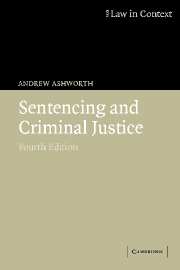Book contents
- Frontmatter
- Contents
- Preface
- Table of statutes
- Table of cases
- 1 An introduction to English sentencing
- 2 Sentencing and the constitution
- 3 Sentencing aims, principles and policies
- 4 Elements of proportionality
- 5 Aggravation and mitigation
- 6 Persistence, prevention and prediction
- 7 Equality before the law
- 8 Multiple offenders
- 9 Custodial sentencing
- 10 Non-custodial sentencing
- 11 Procedural issues and ancillary orders
- 12 Special sentencing powers
- 13 Conclusions
- References
- Index
13 - Conclusions
Published online by Cambridge University Press: 05 June 2012
- Frontmatter
- Contents
- Preface
- Table of statutes
- Table of cases
- 1 An introduction to English sentencing
- 2 Sentencing and the constitution
- 3 Sentencing aims, principles and policies
- 4 Elements of proportionality
- 5 Aggravation and mitigation
- 6 Persistence, prevention and prediction
- 7 Equality before the law
- 8 Multiple offenders
- 9 Custodial sentencing
- 10 Non-custodial sentencing
- 11 Procedural issues and ancillary orders
- 12 Special sentencing powers
- 13 Conclusions
- References
- Index
Summary
The purpose of this chapter is to draw together various themes emerging from the topics examined in the 12 substantive chapters, and to offer some concluding reflections. The chapter begins by returning to a fundamental issue, that of the role sentencing should be expected to fulfil in criminal justice. It then looks at the more positive aspects of the new sentencing framework introduced by the Criminal Justice Act 2003, and at their prospects in practice. This links to the third issue – the new sentencing guideline mechanism and its ability to ensure that the new sentencing framework is translated faithfully into practice. The fourth part of the chapter looks at less constructive aspects of the new sentencing framework, notably its reliance on the rhetoric of protection, its use of the concept of risk and the proliferation of preventive orders in sentencing. The fifth part reassesses the place of proportionality in the new system and the impact of the framework on issues of social justice. The chapter concludes with some reflections on political courage and the need for leadership on criminal justice policy in general and sentencing policy in particular.
The responsibility of sentencing
There is no doubt that the task of sentencing imposes a great burden on magistrates and judges, and that many of them say that it is the hardest and most disturbing of judicial tasks.
- Type
- Chapter
- Information
- Sentencing and Criminal Justice , pp. 380 - 389Publisher: Cambridge University PressPrint publication year: 2005



